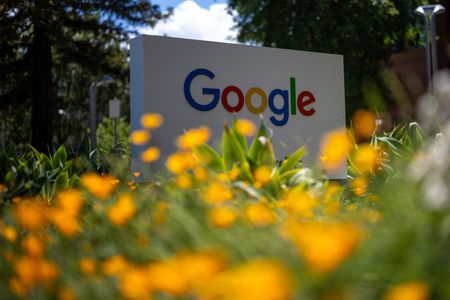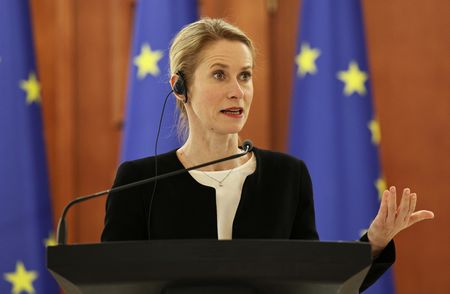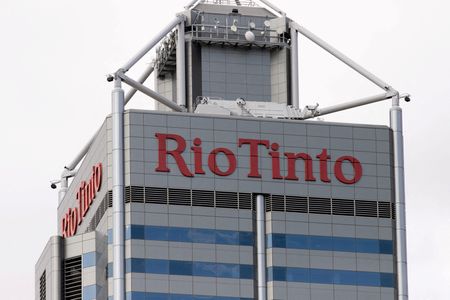By Kenrick Cai, Jeffrey Dastin, Greg Bensinger
MOUNTAIN VIEW, California (Reuters) -Alphabet’s Google said on Tuesday it would put artificial intelligence into the hands of more Web surfers while teasing a $249.99-a-month subscription for its AI power users, its latest effort to fend off growing competition from startups like OpenAI.
Google unveiled the plans amid a flurry of demos that included new smart glasses during its annual I/O conference in Mountain View, California, which has adopted a tone of increased urgency since the rise of generative AI challenged the tech company’s longtime stronghold of organizing and retrieving information on the internet.
In recent months, Google has become more aggressive in asserting it has caught up to competitors after appearing flat-footed upon the release of Microsoft-backed OpenAI’s ChatGPT in 2022.
On Tuesday, it further laid out a vision for Google Search that lets consumers ask virtually anything, from simple queries to complex research questions, from analyzing what a smartphone camera sees to fetching an event ticket to buy. Google likewise said it aims to build AI that is personal and proactive, whether phoning a store for users or sending students a practice test generated on the fly.
CEO Sundar Pichai said at the conference that Alphabet would build such AI with the cost in mind as well. “Over and over, we’ve been able to deliver the best models at the most effective price point,” he said.
Google’s AI assistant Gemini app now has more than 400 million monthly active users, Pichai said.
In a major update, the company said consumers across the United States now can switch Google Search into “AI Mode.” Showcased in March as an experiment open to test users, the feature dispenses with the Web’s standard fare in favor of computer-generated answers for complicated queries.
Google also announced an “AI Ultra Plan,” which for $249.99 monthly provides users with higher limits on AI and early access to experimental tools like Project Mariner, an internet browser extension that can automate keystrokes and mouse clicks, and Deep Think, a version of its top-shelf Gemini model that is more capable of reasoning through complicated tasks.
The price is comparable to $200 monthly plans from AI model developers OpenAI and Anthropic, underscoring how companies are exploring ways to pay for the exorbitant price tag of AI development. Google’s new plan also includes 30 terabytes of cloud storage and an ad-free YouTube subscription.
Google already offers other subscription options, including a $19.99-per-month service with access to some AI capabilities unavailable for most free users and cheaper plans with additional cloud storage. Last week, the company told Reuters it had signed up more than 150 million subscribers across those plans.
Pichai told reporters that the rise of generative AI was not at the full expense of online search.
This “feels very far from a zero-sum moment,” said Pichai. “The kind of use cases we are serving in search is dramatically expanding” because of AI.
Alphabet shares closed 1.5% lower at $165.32 on Tuesday.
RETURN TO GLASSES
Google made a return to a bumpy effort years ago around smart glasses, demonstrating frames with its new Android XR software. Since its early efforts, rival Meta Platforms has brought its own glasses with AI to market.
On stage, two Google officials had a conversation in different languages while the glasses typed up translations for them, viewed through the frames’ lenses.
Gemini, meanwhile, answered queries about one of the wearer’s surroundings as she walked around Mountain View’s Shoreline Amphitheater.
An XR headset being developed in partnership with Samsung will launch later this year, an official said. Google also announced new partnerships with glasses designers Warby Parker and Gentle Monster to develop headsets with Android XR.
SEARCH PRESSURES
Earlier this month, Alphabet stock lost $150 billion in market value in one day after an Apple executive testified during one of Google’s antitrust cases that AI offerings had caused a decline in searches on Apple’s Safari Web browser for the first time.
In turn, some analysts reassessed how to measure Google’s dominant search market share, with one estimate stating it could fall to less than 50% from around 90% in five years. The analysts cited a behavioral shift drawing consumers toward AI chatbots where they once used traditional search engines.
However, Robby Stein, an executive on the search team, in an interview said allowing users to answer more challenging questions through AI could enable “new opportunities to create hyper-relevant, useful advertising.” Ads make up the majority of Google’s revenue.
Investment in AI accounts for most of Alphabet’s $75 billion in forecasted capital expenditures this year, a dramatic uptick from the $52.5 billion in 2024 spending that the company reported.
Tuesday’s announcements included further updates to Google’s work to deliver a “universal AI agent,” which can perform tasks on someone’s behalf without additional prompting.
In a number of demos, Google drew on capabilities developed in a testing ground it has called Project Astra to show off what its latest AI could do.
These included pointing a smartphone camera at a written invitation and having AI add the event to a user’s calendar.
Google also presented a new AI model called Veo 3 that generates video and audio to create more realistic film snippets for creators.
(Reporting by Kenrick Cai, Jeffrey Dastin and Greg Bensinger in Mountain View, California; Additional reporting by Juby Babu in Mexico City; Editing by Sam Holmes, Sayantani Ghosh and Matthew Lewis)










